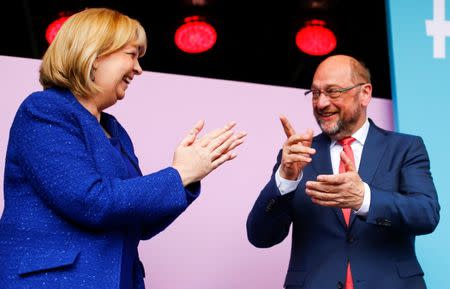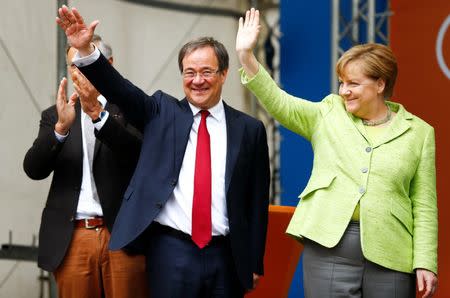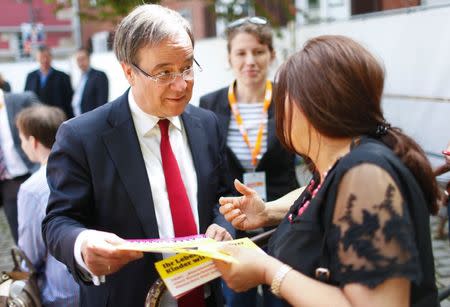Traffic jams, break-ins could cost Germany's SPD key state vote
By Joseph Nasr BERLIN (Reuters) - Chancellor Angela Merkel's conservatives hoped to unseat the ruling Social Democrats (SPD) in an election on Sunday in Germany's most populous state, the final electoral test for both parties before a federal vote in September. The Christian Democrats (CDU) aimed to seize on anger among the 18 million inhabitants of North Rhine-Westphalia (NRW) over clogged traffic, rising crime, an underperforming education system and relatively high unemployment to win. Voter turnout was higher than in the last election, officials said. In the first four hours of voting to 12 noon (1000 GMT), 34 percent of eligible voters cast ballots, up from 29 percent at the same time in 2012. The polls close at 6 p.m. and first projections are expected almost immediately. The SPD has governed NRW for most of the post-war years since 1945, and losing power in what they regard as their bastion would raise serious doubt about their chances of toppling Merkel in just over four months' time. With 32 percent, the CDU were one percentage point ahead of the SPD in NRW just before the election and they have a better chance than their rivals of forming a coalition with their resurgent traditional partners, the liberal Free Democrats. It would be the third state election victory this year for the conservatives, who have retained power in Saarland and ousted the SPD in the northern state of Schleswig-Holstein. They have also extended their lead over the Social Democrats at the national level. Support for the SPD surged in January when the party appointed former European Parliament president Martin Schulz as its leader, vowing to boost welfare and reverse unpopular labor market reforms that expanded Germany's low-pay sector. But Schulz's message of social justice has lost its appeal among voters as he has yet to spell out details of his plans and how much they would cost. At the national level, the SPD is now trailing the CDU and its Bavaria-based Christian Social Union sister party by about 10 percentage points. NO SPEED LIMIT In the NRW campaign, CDU candidate Armin Laschet criticized SPD Premier Hannelore Kraft for failing to tame a rise in crime and fix the state's crumbling roads, frustrating Germans who like to drive on the extensive autobahn network where long stretches have no speed limit. Some 30 percent of all traffic jams reported in Germany last year were in NRW. In addition, 38 percent of all burglaries took place in NRW, home to 22 percent of Germany's population. "I think this is disproportionate and the state government must do something about it, because it is responsible for that," Merkel said earlier this week about the surge in crime in NRW. "The numbers speak for themselves and Armin Laschet is totally right that something must be done." The conservatives ran on a platform of beefing up security - raising prison terms for offenders and providing more funds for the police and security forces. "Being stuck in traffic is time from people's lives," Merkel said. "When you add all the time up over a year, it has become a huge amount of time for commuters in NRW." Kraft hit back at Merkel, saying she was ignoring the SPD's achievements on security in NRW. The SPD aims to increase the number of new police recruits each year to 2,300 from 1,100 in 2010, Kraft said, in a state with more cities than other regions that make it more vulnerable to crime. "She is an unworthy chancellor," Kraft told the broadcaster WDR in response to Merkel's criticism. Kraft has governed NRW since 2010 in a coalition with the environmentalist Greens, whose support among voters has eroded by more than half to just over 6 percent. That would make it hard for the SPD to muster another coalition, especially as their natural partners, the hard-left Die Linke, are also on just 6 percent. (Reporting by Joseph Nasr; editing by Mark Heinrich)



